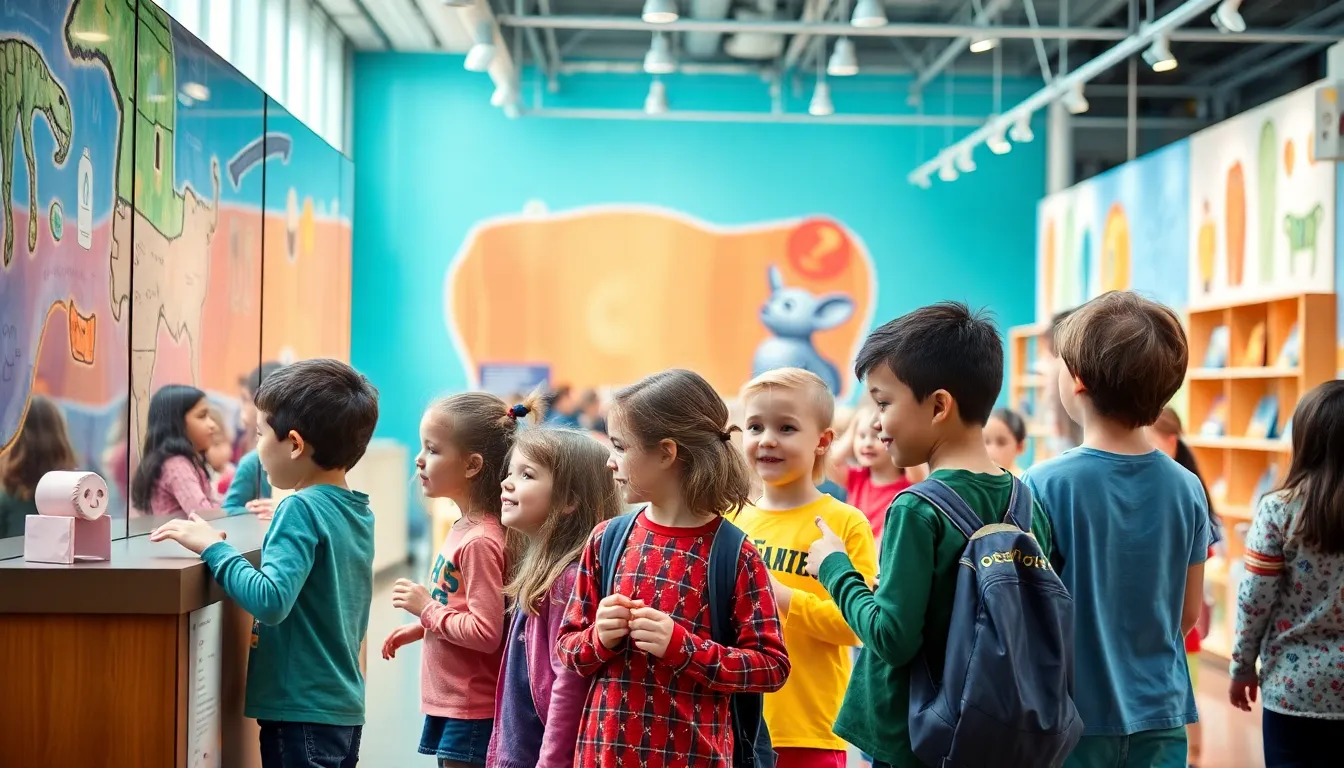Table of Contents
ToggleIn the great educational showdown of our time, unschooling and homeschooling are the dynamic duos battling for the hearts and minds of parents everywhere. Picture this: one approach is all about structured lessons and textbooks, while the other throws out the rulebook and embraces a world of curiosity. It’s like choosing between a well-orchestrated symphony and a spontaneous jam session—both can produce beautiful music, but the style is what sets them apart.
Overview of Unschooling and Homeschooling
Unschooling and homeschooling represent two distinct educational philosophies. Homeschooling provides a structured approach, often utilizing formal curricula. Parents guide their children through lessons, assessments, and educational standards.
In contrast, unschooling emphasizes learner-driven education. It prioritizes curiosity and interests, allowing children to explore subjects at their own pace. Resources like libraries, museums, and real-life experiences often replace traditional textbooks.
Both methods cater to diverse learning styles. Each approach has unique benefits, appealing to different families. Some parents prefer the predictability of homeschooling, while others enjoy the freedom of unschooling.
Regular evaluations in homeschooling help track academic progress. Unschooling fosters independence, focusing on skills relevant to the child’s interests. Families may also incorporate elements of both methods, blending structure with flexibility.
Support networks exist for both homeschooling and unschooling families. Local groups provide resources, workshops, and social opportunities. Online communities further enable sharing experiences and advice.
Ultimately, the choice between unschooling and homeschooling depends on the child’s needs and family values. Understanding these differences assists parents in making informed decisions about their child’s education.
Key Differences Between Unschooling and Homeschooling

Unschooling and homeschooling each embody distinct educational philosophies and approaches to learning.
Educational Philosophy
Homeschooling relies on structured curricula and assessment methods that align with state educational standards. Parents often act as teachers, providing lessons and guidance throughout the education process. In contrast, unschooling adopts a learner-driven philosophy, where children’s natural curiosity directs their education. This method emphasizes exploration and self-directed learning. Children engage with subjects that truly interest them, pursuing knowledge through experiences rather than textbooks. Flexibility characterizes unschooling, allowing for a personalized education that evolves with the child’s interests.
Learning Environment
Home environments differ significantly between homeschooling and unschooling. Homeschoolers typically create dedicated study spaces that resemble traditional classrooms. Consistency in routines and schedules facilitates structured learning. Unschoolers, however, utilize broader environments for learning. Libraries, museums, and real-world experiences serve as educational settings. Children learn in their natural environments, exploring topics as curiosity dictates. This fluid approach encourages spontaneity and creativity. Both methods nurture unique learning experiences, catering to various preferences among families.
Benefits of Unschooling
Unschooling offers several unique advantages that appeal to both parents and children. Focusing on child-led learning stands at the forefront of its approach, encouraging kids to explore topics that ignite their passions. Curiosity drives the educational experience, enabling children to pursue subjects at their own pace. Engagement with real-world experiences leads to deeper understanding and retention of knowledge.
A flexible curriculum plays an essential role in unschooling. Parents tailor learning experiences to fit their children’s interests, allowing for a customized educational journey. With no set schedule or rigid guidelines, families can adapt lessons based on current events or personal projects. This adaptability fosters lifelong learning habits and cultivates independence, as children learn to seek knowledge proactively. Real-world connections become central to the learning process, providing context and relevance that enhances understanding.
Benefits of Homeschooling
Homeschooling presents several benefits that cater to diverse educational needs.
Structured Learning
Structured learning ensures that students cover essential subjects in a systematic manner. This approach allows parents to tailor a curriculum that aligns with state educational standards. Many parents select textbooks, online courses, and lesson plans that fit their child’s learning style. Scheduled lessons promote discipline and regular assessment reinforces understanding. With a clear framework, families can track academic progress and adapt strategies as necessary. Homeschooling materials often include interactive components, enhancing engagement and making learning enjoyable. Such a structured environment helps build a strong foundation in core subjects, equipping children for future academic pursuits.
Parental Involvement
Parental involvement stands out as a significant advantage of homeschooling. Parents can engage closely in their child’s education, fostering a supportive learning atmosphere. Direct interaction enables customized instruction based on the child’s unique learning pace and interests. Families often establish routines that include teaching sessions, discussions, and project work. Involved parents can also nurture critical thinking and problem-solving skills through engaging activities. Open communication facilitates trust, encouraging children to express their needs and seek help. This strong connection between parents and children strengthens relationships while promoting a more personalized educational experience.
Challenges of Unschooling
Unschooling presents several challenges that parents should consider when choosing this approach for their children.
Lack of Structure
Lack of structure often complicates the educational journey in unschooling. Students may struggle without defined schedules and clear expectations. Some learners thrive in less organized environments, but others may find the absence of routine overwhelming. Parents might notice difficulties in tracking academic progress, as assessments vary by individual interests. Establishing a loose structure incorporating daily routines can help provide some balance, yet it still requires flexibility. Without consistent guidelines, children may miss essential subject matter, and parents must actively engage to fill those gaps.
Socialization Concerns
Socialization concerns frequently arise in discussions about unschooling. Families pursuing this approach might worry about their child’s ability to interact with peers. Traditional classrooms offer a built-in social network that unschooling doesn’t always provide. Support networks can mitigate this issue; families should seek out community groups, classes, or extracurricular activities. Local meet-ups and events can also foster friendships and shared learning experiences. As children interact with diverse age groups and backgrounds, they build social skills essential for adulthood, emphasizing the importance of intentional social engagement in an unschooling context.
Challenges of Homeschooling
Homeschooling presents several significant challenges for families. Understanding these hurdles can help parents navigate the complexities of this educational approach.
Time Commitment
Time commitment represents a major concern for homeschooling families. Parents often dedicate substantial hours to preparing lessons, teaching, and assessing student progress. Balancing these responsibilities with work and household duties becomes challenging. Finding effective solutions to streamline lesson planning can alleviate some pressure. Flexible scheduling allows families to accommodate various activities while ensuring educational goals remain on track. Consistent commitment often proves essential for maintaining balance and achieving desired outcomes.
Educational Resources
Educational resources play a crucial role in homeschooling effectiveness. Parents face the task of selecting appropriate curricula, textbooks, and supplementary materials that align with educational standards. Accessing high-quality resources can require extensive research and investment. Online platforms offer a wealth of educational tools, lesson plans, and interactive activities for diverse learning styles. Networking with other homeschooling families can provide valuable insights into effective resources and community support. Ongoing evaluation of educational materials ensures that students receive a comprehensive learning experience.
Choosing between unschooling and homeschooling involves understanding each approach’s unique philosophies and benefits. Families must consider their child’s learning style and their own educational values when making this decision.
Unschooling offers a flexible, curiosity-driven environment that fosters independence and lifelong learning. In contrast, homeschooling provides a structured framework that ensures essential subjects are covered systematically.
Both methods have their challenges but also provide opportunities for personalized education. Ultimately, the right choice will align with the family’s priorities and the child’s needs, paving the way for a fulfilling educational journey.







